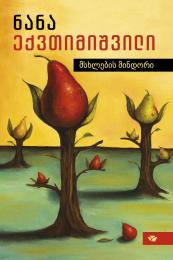THE PEAR-TREE MEADOW
EKVTIMISHVILI NANA
Nana focuses on the subject of disabled children abandoned by their parents. She also speaks about the fate of children who have no guardians, and lack the encouragement, development and implementation of their needs and rights, and who continue to meet on the street and beg for food and shelter. Although they are separated from the community by a barrier, they are still integral and ever-present members of the community. The novel’s main heroine is the eighteen-year-old Lela, who is the centre for all the other characters – present or former boarding school pupils and teachers, people living in nearby apartments… This crowd of characters is developed at a giddy tempo. As well as describing the life of the boarders realistically, Nana Ekvtimishvili tries to find something symbolic for them all. A pear-tree meadow represents them, a meadow of sin with its sinful trees, where the boarders rape one another: the meadow looks beautiful from the outside, but the moment you set foot there, your feet slowly get caught in a quagmire, and the pears that ripen there are watery and tasteless. Lela is also a rape victim, but she is raped not by a fellow boarder, but by a teacher, and all through the novel she thinks about killing him. All this is part of a horrific reality, which fate subjected the author to in her childhood. Nana Ekvtimishvili grew up next to a boarding school, and was in close contact with the children that lived there; she played with them, they told her about anything that happened in the boarding school: ‘I am amazed how I then calmly listened to them, or how one could co-exist with violations, when next to you such things were happening. Nobody ever believed anything these children said, and if they said that anything like that had happened to them, violence or rape, or if they had stolen cherries from the next-door garden, that made no great difference at the time, and nobody paid any attention. Now I am amazed, and I don’t know what to think, I simply knew all this, people somehow accepted this background of general violence, and it didn’t seem to be any great tragedy,’ the author has said in an interview. It all had such an effect on her that when she was a teenager, together with her sister and a few friends, she intended to make a film about it. The fact that a novel has been written about these experiences, clearly, gives it more force.
‘The boarding school in Ekvtimishvili’s novel is our society: a space full of prohibitions or stereotypes, executioners and victims, in which we all live, together with Vano our paedophile or our infantile Irakli; and a society from which escape is just a dream, the fate of only a few chosen, daring inhabitants of the boarding school, just as in Ken Kesey’s novel One Flew over the Cuckoo’s Nest.’
‘The Pear-Tree Meadow is a novel written through the eyes of a film director. Nana Ekvtimishvili describes the action and notes the dialogue, and leaves the secondary characters out of the novel’s frame. I know that this novel has already appealed to many people and the reason may be because the reader, bored to the teeth with Georgian texts that are saturated with sluggishness, has been carried away by this dynamism.’
Extract will be available soon
In case of using the information, please, indicate the source.
‘The boarding school in Ekvtimishvili’s novel is our society: a space full of prohibitions or stereotypes, executioners and victims, in which we all live, together with Vano our paedophile or our infantile Irakli; and a society from which escape is just a dream, the fate of only a few chosen, daring inhabitants of the boarding school, just as in Ken Kesey’s novel One Flew over the Cuckoo’s Nest.’
G. Lomidze, literary critic
‘The Pear-Tree Meadow is a novel written through the eyes of a film director. Nana Ekvtimishvili describes the action and notes the dialogue, and leaves the secondary characters out of the novel’s frame. I know that this novel has already appealed to many people and the reason may be because the reader, bored to the teeth with Georgian texts that are saturated with sluggishness, has been carried away by this dynamism.’
Shota Iatashvili, Literary Critic, Radio Liberty
Extract will be available soon
In case of using the information, please, indicate the source.
